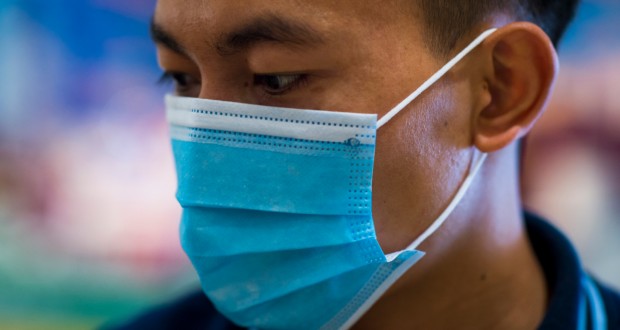It is not a subject usually discussed within the trade, which is by definition made up of thousands of small businesses without the HR resources available to bigger retailers – but that doesn’t mean it is not important. Since the beginning of the crisis, retailers and their staff have been working long hours and unfamiliar shift patterns, coping with surging demand and the addition of new services such as home delivery. They have also been exposed to hundreds of people each day – not knowing whether any one customer is infected with the virus – and have been tasked with maintaining social distancing and at times even restricting sales of in-demand products such as toilet roll, rice and pasta. A recent survey from the Association of Convenience Stores (ACS) found 40% of shops had seen an increase in violence and abuse and there have been several incidents of staff being coughed or spat at by members of the public. Sadly, there have also been a number of deaths among retailers and their staff due to the virus.
Worrying time
All in all, it’s been a worrying time, with Spar retailer David Charman telling Independent Retail News last month that some of his staff felt like “lambs to the slaughter” in the early days of the pandemic and were “extremely worried” about what was going on. “It’s been incredibly difficult for my staff to do their jobs,” he said. Nisa retailer Harj Dhasee, who runs two stores in Gloucestershire and Warwickshire, addressed the issue in a video posted on Twitter to mark Mental Health Awareness Week that has now received more than 1,000 views. In it, he tells how he sat down with members of his team to find out how they were faring. “I volunteer as a Samaritan, so I’ve been trained in how to talk to people to get their emotions and feelings out, and what I discovered was quite a lot of them are not coping very well. Now, I have three members of my team who have called the Samaritans and I would highly recommend for you to think about how you can bring a bit of positivity to your staff, and how you can be there for them, for their mental health, their wellbeing.”
Coping mechanisms
Dhasee told Independent Retail News: “We all do our best, but we don’t always talk on an emotional level. I’ve been volunteering with the Samaritans for about a year and a half, so I know how important it is to talk. In normal times, everyone has different ways of coping, whether that’s playing sport or going to the pub with your mates. But with the lockdown, all of that disappeared. There’s a lot of pressure on our staff and they haven’t had their normal support structures around them. There’s been a lot of anxiety, uncertainty and frustration.”
The picture is corroborated by industry charity GroceryAid, which upgraded its helpline at the beginning of April to feature additional support services. These include callers having immediate access to a counsellor trained by the British Association for Counselling & Psychotherapy, an option of face-to-face counselling (currently via video link) and even online therapy tools to help with common problems such as depression, anxiety and stress. It also has a workplace critical incidents service offering immediate support for traumatic events such as violent attacks, robbery or the death of a colleague.
Huge increase
GroceryAid welfare director Mandi Leonard says the service has seen a huge increase in calls since the start of the coronavirus pandemic in the UK. “We are up about 100% compared with the same month last year,” she said. “At the start of the Covid crisis, we had a lot of calls from colleagues who were nervous about being in-store. It was about things like managing worries and preventing burnout. There have been a lot of emotional concerns around Covid, a lot of worry and anxiety. We have also had calls from grocery colleagues and their partners around furlough and self-isolation and the impact on family budgets and we’ve been able to help with benefits advice.” The charity also runs a management information line, which is especially useful for small retailers without the back-up of a big HR department. “We’ve seen independent retailers contacting us through their symbol groups and through the wholesalers, who we work with very closely. Sometimes it’s the independents that can really benefit.”
Extended family
One independent who has been feeling the strain is Dee Sedani, who runs two One Stop stores in Derbyshire. “We’re trying to protect our team, because they are like our extended family,” he said. Sedani has made sure to keep staff involved in decisions affecting their welfare, such as when to move to restricted hours and when to start to return to normal. “Every time we’ve made a big decision in-store, we’ve had a group meeting where we’ve all talked about how we feel and what we’re thinking. I’ve said if any of you needs someone to talk to or just needs a cry or a hug or whatever, then we will sort something out. A couple have said they were struggling. We’ve offered them to get counselling, but some of them didn’t feel they could just go to talk to a stranger. We have had some good conversations in the group over a bite to eat or a drink in the shop – although that’s been quite hard with social distancing. We’ve not taken it externally. Others say they are just muddling through.”
But Dhasee believes it is often better to speak with a stranger, because it is easier to talk about feelings and emotions if you don’t have to put on the “happy face” you use for work. “It’s good to talk to someone you don’t see every day,” he said. Having worked for the organisation, he would recommend the Samaritans as a good place to start.
“It’s a great service, with great volunteers. If you do need to talk, if you need to unload and you are struggling at the moment coping, just give them a call. It’s one of the best things you will ever do. There’s nothing wrong with admitting life is hard sometimes and things get to you. There’s a lot of anxiety out there.”
The ACS has also been encouraging retailers to make use of the help available. Chief executive James Lowman said: “This has been a time of change for us all and the outbreak has impacted our sector and our colleagues in a number of ways. Now more than ever it is vital we show kindness towards each other and ourselves. We would encourage any colleagues who have been affected by the Covid-19 outbreak to get in touch with GroceryAid to access the help that has been made available.”
Leonard at GroceryAid said: “The best thing independents can do is make sure they and all their colleagues are aware of the GroceryAid helpline and go to either the helpline or website for support whenever they need it.
Seeking support
“Mental health concerns are the number one reason for people being absent from work, and in the current climate it’s exacerbated because they haven’t had their support networks around them, they haven’t been able to see their family and friends.”
Dhasee said it was important for store owners to take care of themselves too. “Retailers need to step back and have a break as well. It’s important to look after your own health and wellbeing. Don’t be afraid to pick up the phone or talk to other retailers, or perhaps buddy yourself up with another retailer to talk about the issues.”
IT’S GOOD TO TALK
Employees will often not feel confident in speaking up, so a manager making the first move to open a dialogue can be key. Regular catch-ups or supervisions are an opportunity to start the conversation. Questions should be simple, open and non-judgemental to give the employee ample opportunity to explain the situation in their own words.
Questions to ask:
■ How are you doing at the moment?
■ You seem to be a bit down/upset/under pressure.
Is everything OK?
■ Is there anything I can do to help?
■ What support do you think might be useful?
MENTAL HEALTH RESOURCES
GroceryAid Helpline
The charity’s 24/7 freephone, confidential helpline has trained counsellors answering calls to provide immediate emotional support for colleagues who are worried or anxious. For those who need in-depth support with mental health, structured counselling services are available. Posters can also be downloaded from the GroceryAid website so retailers can make sure everybody is aware of the phone number. Coronavirus-specific advice is available on the website.
Telephone: 08088 021 122
Email: welfare@groceryaid.org.uk Website: groceryaid.org.uk
Our Frontline
A collaboration between several support charities including Mind and the Samaritans, Our Frontline offers round-the-clock, one-to-one support service for health, care, emergency and key workers, including those in retail, via confidential phone or text conversations with trained volunteers. Online resources are also available.
Telephone: 116 123
Text: KEYWORKER to 85258 Website: mentalhealthatwork.org.uk/ourfrontline
Mental health for small workplaces
A collection of resources for small and medium-sized businesses is available online, including practical tools, e-learning and a mobile app.
Website: https://tinyurl.com/yazzqpt2
The Samaritans
This well-known organisation has a free helpline available 24 hours a day, 365 days a year, offering immediate help for anyone who is struggling. It recently launched a self-help app to suggest practical support and enable people to track their moods. It also offers workplace-specific support.
Telephone: 116 123
Email: jo@samaritans.org
Website: samaritans.org
 Talking Retail Grocery and product news for independent retailers
Talking Retail Grocery and product news for independent retailers






